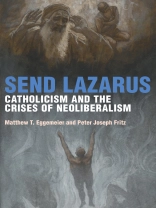Today’s regnant global economic and cultural system, neoliberal capitalism, demands that life be led as a series of sacrifices to the market.
Send Lazarus’s theological critique wends its way through four neoliberal crises: environmental destruction, slum proliferation, mass incarceration, and mass deportation, all while plumbing the sacrificial and racist depths of neoliberalism.
Tabla de materias
List of Abbreviations | ix
Introduction | 1
Introducing Neoliberalism, 2 • Catholic Critique of Neoliberalism, 4 •
Chapter Outlines, 7 • Send Lazarus, 11
Part I : Catholic Social Thought and the Economy
1 Catholic Social Thought against Economism | 15
Modern Catholic Social Thought, 17 • John Paul II on
Economism, 20 • Benedict XVI: Against an Impersonal
Economy, 33 • Francis: No to a Faceless Economy, 46 •
Papal Continuity, 56
Part II: Neoliberalism
2 Neoliberal Capitalism | 65
Neoliberalism as Political Economy, 66 •
Neoliberalism as Common Sense, 76 •
Ethos of Mercilessness, 86
3 Sacrifice, Race, and Indifference | 94
Sacrifice Zones, Earth, and Slums, 96 • Racial Neoliberalism,
Mass Incarceration, and Mass Deportation, 110 •
Neoliberalism as Culture of Indifference, 123
Part III: Catholic Mercy in a Neoliberal Age
4 A Theology of Mercy | 133
Trinity, Mystery, and Mercy, 134 • Anthropology, Ecclesiology,
and Mercy, 144 • The Works and the Politics of Mercy, 153
5 The Politics of Mercy against Neoliberal Sacrifice | 164
Universal Destination of Goods, 165 • Visit the Sick, 167 •
Give Food, Drink, and Clothing, 175 • Abolitionism, 180 •
Ransom the Captive, 188 • Welcome the Stranger, 195
Conclusion : For Holistic Mercy | 205
Acknowledgments| 209
Notes | 211
Bibliography | 245
Index | 269
Sobre el autor
Peter Joseph Fritz is Associate Professor of Religious Studies at the College of the Holy Cross. He is author of Karl Rahner’s Theological Aesthetics and Freedom Made Manifest: Rahner’s Fundamental Option and Theological Aesthetics.







![Portada de Brian Schrag & Julisa Rowe: Community Arts for God's Purposes [Chinese] 貼近神心意的社群藝術 Portada de Brian Schrag & Julisa Rowe: Community Arts for God's Purposes [Chinese] 貼近神心意的社群藝術](https://static.worldofdigitals.com/thumb_webp/740/9781645083740.webp)




